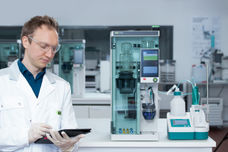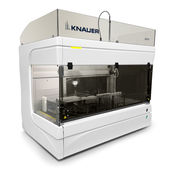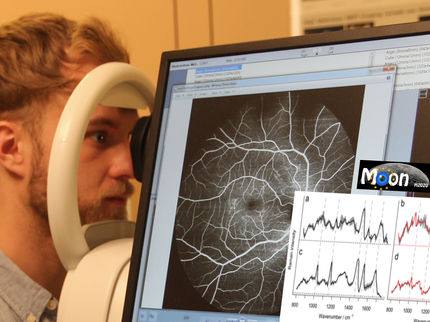Blood Test Provides Information on Alzheimer’s and atypical Parkinson’s
Reliable information can be obtained on the progression of dementias by measuring specific proteins in the blood and cerebrospinal fluid. A test of this kind is especially significant to the development of new therapies, as reported in the journal Neuron by scientists from the University of Basel and University Hospital Basel, along with international colleagues.
Dementias such as Alzheimer’s and atypical Parkinson’s are often associated with damage to nerve cells in the brain. Neurologists at University Hospital Basel and the Departments of Biomedicine and Clinical Research at the University of Basel have now succeeded in measuring specific threadlike proteins in blood samples that are released in the process: Neurofilament light chain. These come from inside nerve cells, where they form part of the cytoskeleton, giving it shape and stability. In neurodegenerative diseases, it is now possible to detect neurofilaments in the cerebrospinal fluid and also at low concentrations in the blood.
Tracking the disease’s progression
“Our results suggest that the disease’s progression can be tracked by determining the concentration of neurofilaments. This method paves the way for reliable measurements both in the animal model and in humans,” explains private lecturer Dr. Jens Kuhle, head of the research group at the Department of Clinical Research in Basel. This allows the findings from animal models to be transferred to clinical trials and makes it easier to compare the results of these trials – which is key to the development of new therapies.
It is known from earlier research at the University of Tübingen that the brains of mice with neurodegenerative diseases accumulate specific proteins, such as alpha-synuclein, tau or beta-amyloid. These proteins combine into aggregates when nerve cells are damaged in neurodegenerative diseases. The researchers have now been able to measure the concentration of neurofilaments in the blood and cerebrospinal fluid of affected animals, as well as in samples from affected humans.
Varying measurements depending on brain damage
In the mice, a close correlation was observed between the concentration of neurofilaments in the cerebrospinal fluid and in the blood. Moreover, the higher the measurements, the further the brain damage had progressed. When the pathological changes were exacerbated or individually halted in the laboratory animals, the neurofilament concentration rose or fell accordingly. Likewise, in patients with neurodegenerative diseases such as atypical Parkinson’s or dementia, there was a strong correlation between the values measured in the bloodstream and cerebrospinal fluid, and these were also higher than in healthy individuals.
The study by the researchers in Basel and Tübingen demonstrates that these blood parameters can provide reliable information regarding neurodegeneration in the brain. It may therefore be possible to dispense with a cerebrospinal fluid analysis, which is often distressing for patients and cannot be repeated arbitrarily. “If we can make do with simple blood samples in the future, this would be especially significant for clinical trials, such as those aiming to demonstrate the protective or therapeutic effect of medications in patients as reliably as possible,” Kuhle explains.
Original publication
Mehtap Bacioglu et al.; "Neurofilament light chain in blood and CSF as marker of disease progression in mouse models and in neurodegenerative diseases"; Neuron; 2016
Most read news
Original publication
Mehtap Bacioglu et al.; "Neurofilament light chain in blood and CSF as marker of disease progression in mouse models and in neurodegenerative diseases"; Neuron; 2016
Topics
Organizations
Other news from the department science
These products might interest you

Kjel- / Dist Line by Büchi
Kjel- and Dist Line - steam distillation and Kjeldahl applications
Maximum accuracy and performance for your steam distillation and Kjeldahl applications

AZURA Purifier + LH 2.1 by KNAUER
Preparative Liquid Chromatography - New platform for more throughput
Save time and improve reproducibility during purification

Get the analytics and lab tech industry in your inbox
By submitting this form you agree that LUMITOS AG will send you the newsletter(s) selected above by email. Your data will not be passed on to third parties. Your data will be stored and processed in accordance with our data protection regulations. LUMITOS may contact you by email for the purpose of advertising or market and opinion surveys. You can revoke your consent at any time without giving reasons to LUMITOS AG, Ernst-Augustin-Str. 2, 12489 Berlin, Germany or by e-mail at revoke@lumitos.com with effect for the future. In addition, each email contains a link to unsubscribe from the corresponding newsletter.



























































